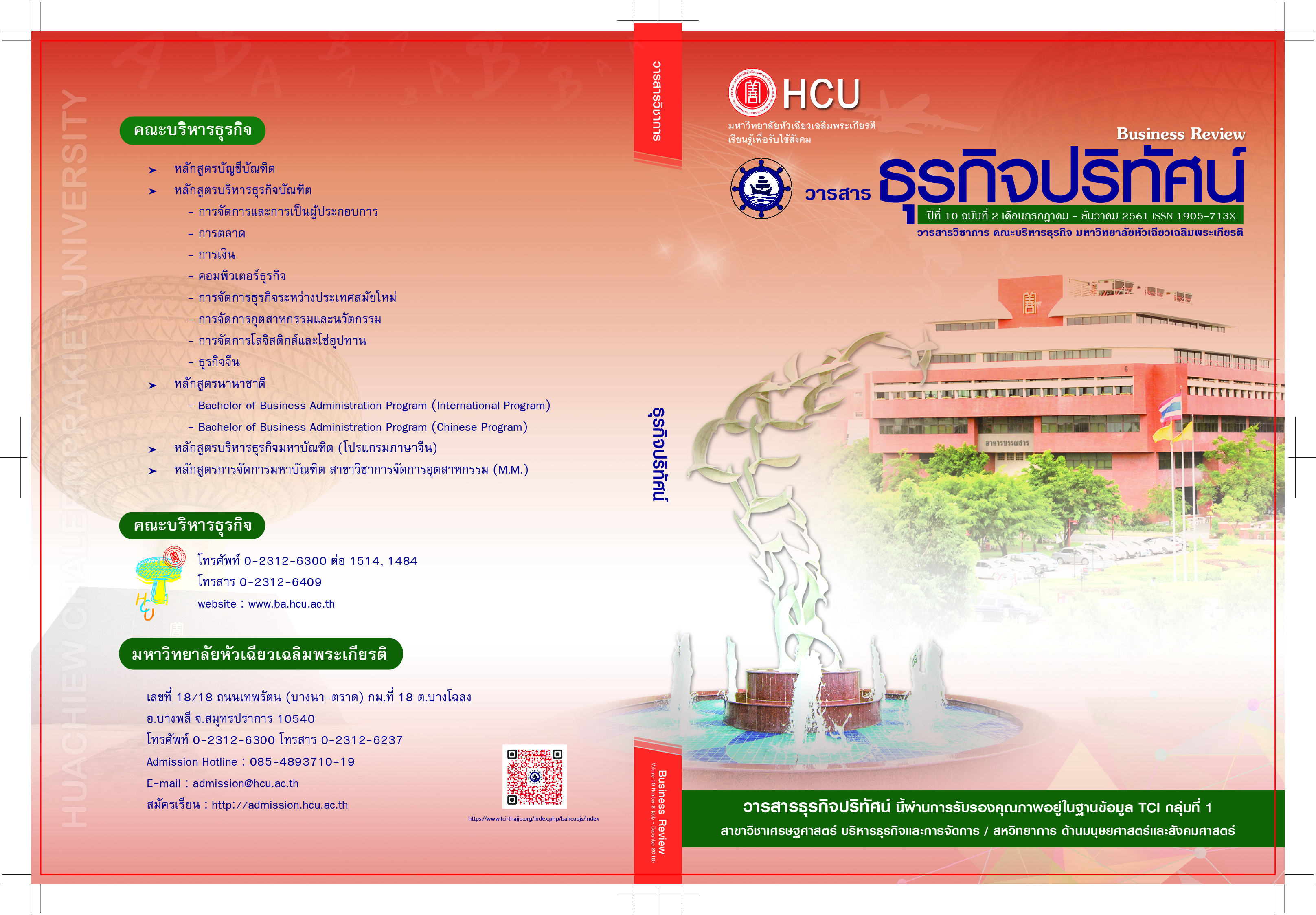Factors Affecting Purchasing Behavior of Environmental-friendly Products among Thai and Laos Consumers in Loei Province
Keywords:
Purchasing behavior, Environmental-friendly products, Thai consumers, Laos consumersAbstract
This research aimed at studying personal characteristics affecting purchasing
behavior of environmental-friendly products among Thai and Laos consumers in Loei
province, and exploring relationship between needs in purchasing environmental-friendly
products in terms of product, price, distribution channel and promotion with purchasing
behavior of environmental-friendly products among Thai and Laos consumers in Loei
province. This quantitative research employed 390 Thai and Laos consumers, 229 Thais and
161 Laos, in Loei province as a sample group by accidental sampling technique using
bilingual questionnaires with 6 factors: (1) personal characteristics (2) needs of products (3)
needs of price (4) needs of distribution channel (5) needs of marketing promotion and (6)
purchasing behavior of environmental-friendly products. Descriptive statistics, T-test, F-test,
LSD’s comparison, Pearson’s correlation and multiple regression were adopted for data
analysis. The research revealed 1) Thai and Laos consumers with different ages, incomes
and careers had different purchasing behavior of environmental-friendly products
significantly at 0.05 statistical level; 2) needs of products, price, distribution channel and
marketing promotion had relationship with purchasing behavior of environmental-friendly
products; and 3) factors of needs of product, distribution channel and marketing promotion
had influence towards purchasing behavior of environmental-friendly products.
References
การซื้อสินค้าที่เป็นมิตรต่อสิ่งแวดล้อมของผู้บริโภคในภาคตะวันออกเฉียงเหนือ. วารสาร
บริหารศาสตร์ มหาวิทยาลัยอุบลราชธานี, 2(3), 65 – 83.
ณัฐกนก รัตนางกูล. (2553). การศึกษาปัจจัยทางการตลาดที่มีอิทธิพลต่อการตัดสินใจซื้อสินค้าที่เป็น
มิตรกับสิ่งแวดล้อมของผู้บริโภคในเขตกรุงเทพมหานคร. วิทยานิพนธ์บริหารธุรกิจ มหาบัณฑิต,
มหาวิทยาลัยกรุงเทพ.
ณัฐณิชา นิสัยสุข และขวัญกมล ดอนขวา. (2558). ปัจจัยที่มีผลต่อพฤติกรรมการซื้อผลิตภัณฑ์ที่เป็น
มิตรกับสิ่งแวดล้อมของผู้บริโภค. วารสารชุมชนวิจัย มหาวิทยาลัยราชภัฏนครราชสีมา, 9(2),
57-67.
ณัฐพล อัสสะรัตน์ และ พัฒน์นรี ศรีศุภโอฬาร. (2551). ศึกษาการวัดพฤติกรรมการบริโภคที่เป็นมิตร
ต่อสิ่งแวดล้อม: การวิจัยเชิงสำรวจ. จุฬาลงกรณ์ธุรกิจปริทัศน์, 30(117-118), 145-156.
นงลักษณ์ วิรัชชัย. (2553). ชุดวิชา 21701 การวิจัยหลักสูตรและการเรียนการสอน หน่วยที่ 7 การศึกษา
วรรณกรรมที่เกี่ยวข้อง และหน่วยที่ 10 สถิติวิเคราะห์เชิงปริมาณ: สถิติบรรยายและสถิติพารา
เมตริก หลักสูตรปริญญาศึกษาศาสตรมหาบัณฑิต สาขาหลักสูตรและการสอน. สืบค้นเมื่อ 20
มีนาคม 2561, จาก คณะจิตวิทยา จุฬาลงกรณ์มหาวิทยาลัย เว็บไซต์: https://goo.gl/AtX6QE
นารา กิตติเมธีกุล (2559). พฤติกรรมการซื้อของผู้บริโภครายย่อยชาวลาวในนครหลวงเวียงจันทน์ต่อ
อาหารทะเลสดในจังหวัดหนองคาย. วารสารรัชต์ภาคย์, 10 (19), 44-54.
นิศาชล ลีรัตนากร. (2556). รูปแบบการบริโภคสีเขียว ของผู้บริโภคในจังหวัดเชียงใหม่. กรุงเทพ-
มหานคร : ฐานข้อมูลโครงสร้างพื้นฐานภาครัฐด้านวิทยาศาสตร์และเทคโนโลยี กระทรวง
วิทยาศาสตร์และเทคโนโลยี.
ปาริชาติ ชิตตโสภณ. (2554). ผลการดำเนินงานของสถานประกอบการที่ได้รับการรับรองมาตรฐาน
ระบบการจัดการสิ่งแวดล้อม ISO 14001. วิทยานิพนธ์บริหารธุรกิจมหาบัณฑิต, มหาวิทยาลัย
รามคำแหง.
มธุรพจน์ ศรีโพนทอง (2560). พฤติกรรมการบริโภคสินค้าออร์แกนิกของชาวเยอรมันและโอกาสของ
ผู้ประกอบการไทย. วารสารธุรกิจปริทัศน์, 9(1), 263-277.
ศูนย์พัฒนาเศรษฐกิจไทยในอาเซียน. (2561). สปป.ลาว. สืบค้นวันที่ 9 พฤษภาคม 2561, จาก กรม
ส่งเสริมการค้าระหว่างประเทศ เว็ปไซต์: https://goo.gl/dtVE9Z
สำนักงานคณะกรรมการพัฒนาการเศรษฐกิจและสังคมแห่งชาติ. (2558). แผนพัฒนาเศรษฐกิจและสังคม
แห่งชาติ ฉบับที่ 12 พ.ศ.2560-2564. สืบค้นวันที่ 12 มกราคา 2560, จาก สำนักงานคณะ
กรรมการพัฒนาการเศรษฐกิจและสังคมแห่งชาติ เว็บไซต์: http://www.nesdb.go.th/
ewt_dl_link.php?nid=6422
สุกัญญา หมู่เย็น. (2559). พฤติกรรมการบริโภคสินค้าสีเขียวของประชาชนใน ตำบลบางปรอก อำเภอ
เมือง จังหวัดปทุมธานี. การประชุมวิชาการและเสนอผลงานวิจัยระดับชาติ ครั้งที่ 3 ก้าวสู่
ทศวรรษที่ 2 : บูรณาการงานวิจัย ใช้องค์ความรู้ สู่ความยั่งยืน, 17 มิถุนายน 2559 ณ วิทยาลัย
นครราชสีมา. จังหวัดนครราชสีมา: วิทยาลัยนครราชสีมา.
สุดารัตน์ กันตะบุตร. (2554). ปัจจัยที่มีความสัมพันธ์ต่อการตัดสินใจซื้อสินค้าเพื่อสิ่งแวดล้อมของ
ผู้บริโภคในจังหวัดนครราชสีมา. ปริญญาบริหารธุรกิจมหาบัณฑิต, มหาวิทยาลัยเทคโนโลยี
ราชมงคลธัญบุรี.
โสมสกาว เพชรานนท์ และวลัยภรณ์ อัตตะนันท์. (2557). ปัจจัยที่มีผลต่อความตระหนักและพฤติกรรม
การบริโภคผลิตภัณฑ์ที่เป็นมิตรกับสิ่งแวดล้อม. การประชุมทางวิชาการของมหาวิทยาลัย
เกษตรศาสตร์ ครั้งที่ 52, 4-7 กุมภาพันธ์ 2557 ณ ภาควิชาเศรษฐศาสตร์ คณะเศรษฐศาสตร์,
มหาวิทยาลัยเกษตรศาสตร์. กรุงเทพฯ: มหาวิทยาลัยเกษตรศาสตร์.
Chen, K., and Deng, T. (2016). Research on the Green Purchase Intentions from the Perspective
of Product Knowledge. Sustainability, 8(9), 1-16.
Gan, C., Wee, H.Y., Ozanne, L, & Kao,T. H. (2008). Consumers’ purchasing behavior towards
green products in New Zealand. Innovative Marketing, 4(1), 93-102.
Hair, J.F., Black, W.C., Babin, B.J., & Anderson, R.E. (2010). Multivariate data Analysis: A
global perspective. 7th ed. New Jersey: Pearson Prentice Hall.
Kotler, P., and Keller, K. L. (2016). Marketing management 15th ed. Boston, MA: Pearson.
Solomon, M. R. (2009). Consumer behavior: In fashion. New jersey: Pearson Prentice Hall.
UN Division for Sustainable Development. (2012). A guidebook to the Green Economy: Issue 1
Green economy, green growth, and low-carbon development, history, definitions and
a guide to recent publications. Retrieved November 14, 2015, from sustainable
development.un.org Website: https://sustainabledevelopment.un.org/content/.../GE%
20Guidebook.pdf
Zhu, Q., Li, Y., Geng, Y, & Qi, Y. (2012). Green food consumption intention, behaviors
and influencing factors among Chinese consumers. Food Quality and Preference, 28(1),
279–286.
Downloads
Published
How to Cite
Issue
Section
License
All articles published in the Business Administration and Management Journal Review are copyrighted by the journal.
The views and opinions expressed in each article are solely those of the individual authors and do not represent those of Huachiew Chalermprakiet University or any other faculty members. Each author is fully responsible for the content of their own article. Any errors or issues found are the sole responsibility of the respective author.




